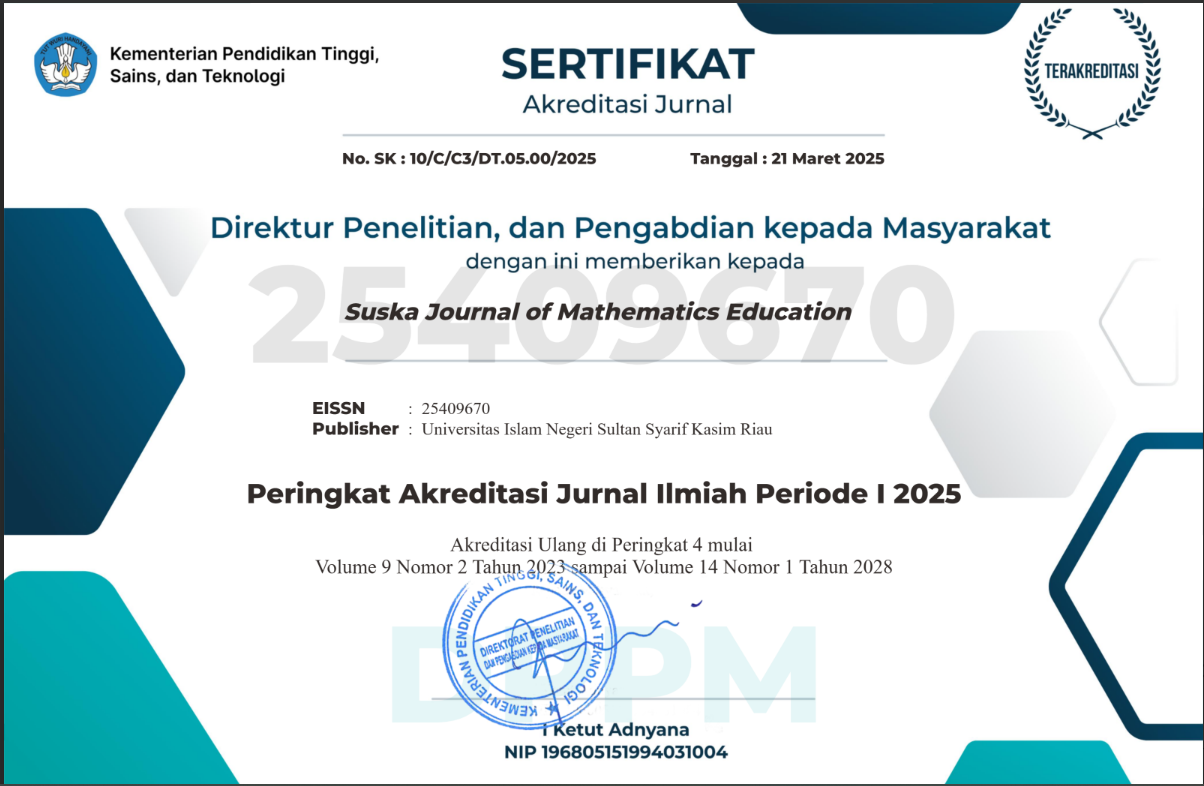Penggunaan Teknologi Digital Pada Perkuliahan Matematika Dasar Untuk Meningkatkan Hasil Belajar Mahasiswa
Abstract
Tujuan artikel ini adalah untuk mempresentasikan kegiatan pembelajaran mahasiswa berbantuan teknologi digital untuk memahami konsep dan mampu menyelesaikan masalah dalam perkuliahan matematika dasar. Penelitian ini adalah pre-eksperimental yang melibatkan 90 mahasiswa dalam satu kelas di salah satu STIKES di Jawa Barat. Teknologi digital yang digunakan adalah video online, game online, dan simulasi konsep matematika online. Instrumen yang digunakan adalah tes uraian singkat dan angket. Selanjutnya data dianalisis menggunakan model Rasch berbantuan software Winstep. Hasil penelitian menunjukkan rata-rata peningkatan hasil belajar matematika adalah kategori sedang dan lebih dari setengah jumlah mahasiswa memiliki sikap yang positif terhadap pembelajaran matematika. Oleh karena itu perlunya penelitian lebih lanjut tentang kompetensi peserta didik melalui pembelajaran digital.
Keywords
Full Text:
PDFReferences
Artigue, M. (2010). The Future of Teaching and Learning Mathematics with Digital Technologies. Dalam C. Hoyle & J.-B.
Lagrange (Ed.), Mathematics Education and Technology-Rethinking the Terrain. Springer Science + Business Media, LLC.
Chiu, T. K. F., & Churchill, D. (2015). Exploring the Characteristics Of An Optimal Design Of Digital Materials For Concept Learning In Mathematics: Multimedia Learning And Variation Theory. Computers and Education, 82, 280–291.
Geiger, V., Goos, M., & Dole, S. (2015). The Role of Digital Technologies in Numeracy Teaching and Learning. International Journal of Science and Mathematics Education, 13(5), 1115–1137.
Hoyles, C., Noss, R., & Kent, P. (2004). On the Integration Of Digital Technologies Into Mathematics Classrooms. International Journal of Computers for Mathematical Learning, 9(3), 309–326.
Huang, C. S. J., Su, A. Y. S., Yang, S. J. H., & Liou, H. H. (2017). A collaborative Digital Pen Learning Approach To Improving Students’ Learning Achievement And Motivation In Mathematics Courses. Computers and Education, 107, 31–44.
Huang, Y. M., Huang, S. H., & Wu, T. T. (2014). Embedding Diagnostic Mechanisms In A Digital Game For Learning Mathematics. Educational Technology Research and Development, 62(2), 187–207.
Joubert, M. (2013). Using Digital Technologies In Mathematics Teaching: Developing An Understanding Of The Landscape Using Three “Grand Challenge” Themes. Educational Studies in Mathematics, 82(3), 341–359.
Lantz-Andersson, A., Linderoth, J., & Säljö, R. (2009). What’s The Problem? Meaning making And Learning To Do Mathematical Word Problems In The Context Of Digital Tools. Instructional Science, 37(4), 325–343.
Larkin, K., & Calder, N. (2016). Mathematics education And Mobile Technologies. Mathematics Education Research Journal, 28(1), 1–7.
Meltzer, D. E. (2001). Addendum to: The Relationship Between Mathematics Preparation And Conceptual Learning Gains In Physics: A Possible “Hidden Variable” In Diagnostic Pretest Score. http://www.physicseducation.net/docs/Addendum_on_normalized_gain.pdf. [Diakses 19%0AJuni 2014]
Moyer-Packenham, P. S., Lommatsch, C. W., Litster, K., Ashby, J., Bullock, E. K., Roxburgh, A. L., Shumway, J. F., Speed, E., Covington, B., Hartmann, C., Clarke-Midura, J., Skaria, J., Westenskow, A., MacDonald, B., Symanzik, J., & Jordan, K. (2019). How design Features In Digital Math Games Support Learning And Mathematics Connections. Computers in Human Behavior, 91, 316–332.
NCTM. (2000). Principles and Standards for School Mathematics. United States of America: The National Council of Teachers of Mathematics, Inc.
Nurdin, E., Ma’aruf, A., Amir, Z., Risnawati, R., Noviarni, N., & Azmi, M. P. (2019). Pemanfaatan Video Pembelajaran Berbasis Geogebra Untuk Meningkatkan Kemampuan Pemahaman Konsep Matematis Siswa SMK. Jurnal Riset Pendidikan Matematika, 6(1), 87–98. https://doi.org/10.21831/jrpm.v6i1.18421
Paul Drijvers. (t.t.). Digital Technology in Mathematics Education: Why It Works (Or Doesn’t). Selected Regular Lectures from the 12th International Congress on Mathematical Selected Regular Lectures from the 12th International Congress on Mathematical Education Sung Je Cho Editor.
Pepin, B., Choppin, J., Ruthven, K., & Sinclair, N. (2017). Digital curriculum Resources In Mathematics Education: Foundations For Change. ZDM - Mathematics Education, 49(5), 645–661.
Santos-Trigo, M., Reyes-Martínez, I., & Ortega-Moreno, F. (2015). Fostering and supporting The Coordinated Use Of Digital Technologies In Mathematics Learning. International Journal of Learning Technology, 10(3), 251–270.
Sudihartinih, E., & Wahyudin, W. (2019). Pembelajaran Berbasis Digital: Studi Penggunaan Geogebra Berbantuan E-Learning Untuk Meningkatkan Hasil Belajar Matematika. Jurnal Tatsqif, 17(1), 87–103.
Yanuar, Y. (2019). 5 Kebijakan Mendikbud Nadiem untuk Kembangkan Pendidikan.
DOI: http://dx.doi.org/10.24014/sjme.v7i1.11723
Refbacks
- There are currently no refbacks.

This work is licensed under a Creative Commons Attribution 4.0 International License.
Published by:

FLAG COUNTER






